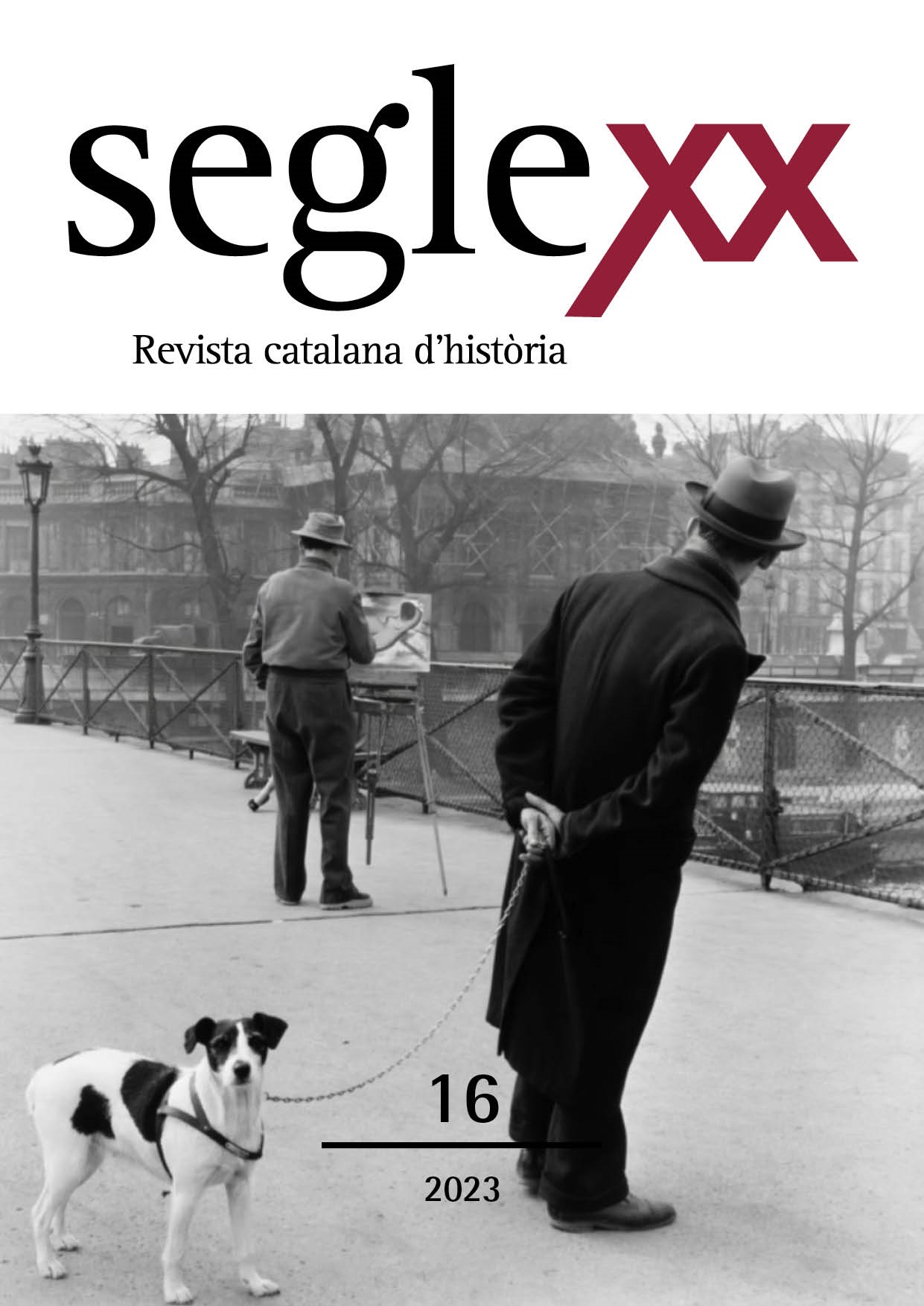Brian Simon y el Comité Nacional Cultural del Partido Comunista de Gran Bretaña
DOI:
https://doi.org/10.1344/segleXX2023.16.5Palabras clave:
comunisme, intel-lectuals, política cultural, Partit Comunista de Gran Bretanya, Brian SimonResumen
Este artículo estudia la actuación del reputado historiador de la educación Brian Simon al frente del Comité Nacional Cultural del Partido Comunista de Gran Bretaña. Tras la crisis provocada por la invasión de Hungría por la urss en 1956, Simon se puso al servicio del partido para contrarrestar los efectos del nacimiento de la New Left. En 1957 entró en el Comité Nacional Cultural junto con James Klugmann y Arnold Kettle, y lo dirigió a partir de 1962. Al frente del grupo intelectual conocido como los “humanistas socialistas”, Simon lideró la renovación ideológica del comunismo británico a lo largo de los años sesenta, desde la ortodoxia estalinista hasta posiciones cercanas al eurocomunismo. Un hito en esta evolución ideológica fue la publicación en 1967 de Questions of Ideology and Culture.
Descargas
Citas
The British Road to Socialism. Communist Party of Great Britain.
Résolution sur les problèmes idéologiques et culturels adoptée par le comité central du parti communiste français, 13 mars 1966. Impr. I.C.C.
Questions of Ideology and Culture. Communist Party.
AJELLO, N. 1979. Intelletuali e PCI, 1944-1958. Laterza
~ 1979. Il lungo addio. Intelettuali e PCI dal 1958 al 1991. Laterza.
ANDREWS, G. 1995. “Young Turks and Old Guard: Intellectuals and the Communist Party Leadership in the 1970s”. En ANDREWS, G., FISHMAN, N. y MORGAN, K., Opening the Books. Essays on the Social and Cultural History of the Bristish Communist Party. Pluto, 225-250.
~ 2004. Endgames and New Times. The final years of British Communism, 1971-1991. Lawrence & Wishart.
~ 2015. The Shadow Man. At the heart of the Cambridge Spy Circle. IB. Tauris, 2015.
AZNAR SOLER, M. 2009. “Los intelectuales y la política cultural del Partido Comunista de España (1939-1956)”. En BUENO, M. y GÁLVEZ, S. Nosotros los comunistas: memoria, identidad e historia social. FIM.
BECKETT, F. 1995. Enemy within: the rise and fall of the British Communist Party. John Murray.
CALLAGHAN, John. 2003. Cold War, Crisis and Conflict. The CPGB 1951-68. Lawrence & Wishart.
ELEY, G. 1984. “Reading Gramsci in English. Observations on the reception of Antonio Gramsci in the English speaking world”. European History Quarterly, 14, 441-477.
EVANS, R.J. 2020. Eric Hobsbawm. A life in history. Abacus, p. 132. Hobsbawm, E. (2002). Interesting times. A Twentieh-Century Life. Pantheon Books, 2002,
FORGACS, D. 1989. “Gramsci and Marxism in Britain”. New Left Review, 1/176, 70-88. p. 70
HOARE, Q. y NOWELL SMITH, G. 1971. Selections from the prison notebooks of Antonio Gramsci. Lawrence and Wishart.
JACQUES, M. 1991. “The Last Word”. Marxism Today, december, 28.
JUDT, T. 1992. Past Imperfect: French Intellectuals, 1944-1956. Univesity of California Press.
KENNY, M. 1995. “Communism and the New Left”. En ANDREWS, G., FISHMAN, N. y MORGAN, K., Opening the Books. Essays on the Social and Cultural History of the Bristish Communist Party. Pluto, 195-209.
KETTLE, A. 1959. “The Artist and Politics”. Marxism Today, May
~ 1960. Communism and the Intellectuals. Lawrence & Wishart.
~ 1961. “Culture and Revolution. A consideration of the Ideas of Raymond Williams and Others”. Marxism Today, October.
LEWIS, J. 1972. “The Althusser Case” (parts I and II). Marxism Today, enero y febrero; ALTHUSSER, L. 1972. “Reply to John Lewis” (parts I and II). Marxism Today, octubre y noviembre.
MACCABE, C. 1977. “Britains’s Communist University”. New Statesman, 20/5/1977.
MAGGIO, M. di. 2013. Les intellectuels et la stratégie communiste. Une crise d’hégémonie (1958-1981). Les éditions sociales.
MARTELLI, R. 2017. Une dispute communiste: Le comité central d’Argenteuil. Les éditions sociales.
MCCULLOCH, G. (2010). “A people’s history of education: Brian Simon, the British Communist Party and Studies in the History of Education, 1780–1870”. History of Education, 39, (4), 437–457, p. 441.
~ 1991. Philosophers and Kings. Education for Leadership in Modern England. Cambridge University Press.
MCCULLOCH, G., CANALES, A.F. y KU, H.Y. (2023). Brian Simon and the Struggle for Education. UCL, pp. 1-4.
NIVEN, B. 1960. “Proposals for the Arts”. Marxism Today, April, 4 (4), 117-122.
PALA, G. 2016. Cultura clandestina. Los intelectuales del PSUC bajo el franquismo. Comares.
SIMON, B. 1960. Freedom, Communist Party.
~ 1998. A Life in Education. Lawrence & Wishart
STEELE, T. 1999. “Hey Jimmy! The Legacy of Gramsci in British Cultural Politics”.En ANDREWS, G., COCKETT, R., HOOPER, A. y WILLIAMS, M. New Left, New Right and Beyond. Taking the Sixties Seriously. Palgrave MacMillan, 26-41
VITTORIA, A. 1992. Togliatti e gli intellettuali. Storia dell’Istituto Gramsci negli anni Cinquanta e Sessanta. Editori Riuniti.
WAITE, M. 1995. “Sex ‘n’ Drugs ‘n’ Rock ‘n’ Roll (and Communism) in the 1960s”. En ANDREWS, G., FISHMAN, N. y MORGAN, K., Opening the Books. Essays on the Social and Cultural History of the Bristish Communist Party. Pluto, 210-224.
Publicado
Cómo citar
Número
Sección
Licencia
Derechos de autor 2024 Segle XX revista catalana d'història

Esta obra está bajo una licencia internacional Creative Commons Atribución-NoComercial-SinDerivadas 4.0.
El autor o la autora a que publica en esta revista está de acuerdo con los términos siguientes:
a. El/la autor/a cede en exclusiva todos los derechos de propiedad intelectual al/la editor/a para todo el mundo y toda la duración de los derechos de propiedad intelectual vigentes aplicables.
b. El/la editor/a difundirá los textos con la Atribución-No Comercial- No Derivada 4.0 International que permite compartir la obra con terceros, siempre que éstos reconozcan su autoría, su publicación inicial en esta revista y las condiciones de la licencia.












